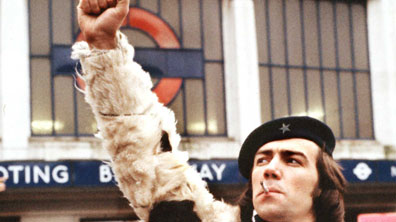It turns out to be necessary to do one more week in Cambridge, wandering the towers of the gargantuan University Library and photocopying a 10-centimetre wedge of research material, which I now know is close to the maximum that my back-pack can carry; it has to be over a thousand pages, though I don’t want to think about this because I have to read them.
The week gets off to a good start with breakfast with Tim Clissold, author of the excellent Mr China, the stranger-than-fiction tale of investing several hundred million dollars in China in the mid-1990s. Tim trained as an accountant, then learned Chinese, then teamed up with a high-flying American investment banker who had raised (what was) the single biggest fund for buying businesses in the Middle Kingdom. I wrote about this in The China Dream, but Tim’s warts-and-all inside story turned out to be perhaps the best insider tale of China business that has yet been written. And in the meantime, he drew a good salary, invested wisely, went on to do a stint of investment banking with Goldman Sachs, and then launched his own entrepreneurial investment career buying and turning around small-ish industrial businesses. I live and learn.
For me, the remarkable thing about Tim is his ability to see the most outrageous, grasping, brazen scams as intellectual curiosities. In his first career in China he was threatened, kidnapped and daily deceived. His response was that of an astute provincial accountant confronted by a loutish child on a bus: faint bemusement and a simple determination to deal with the situtation, with or without the conductor’s help. He is very good at seeing the other person’s point of view; but also rather principled.
Tim’s latest adventure is carbon trading in China; he maintains an office of about 20 people. It is, he says, at least as scurrilous as anything he has dealt with before and more than likely the basis of a new book. Pay-offs, forged signatures, phantom projects — all are par for the course in securing cash for supposed pollution reduction under the UN-sponsored global carbon trading scheme. The evening before we meet he had dinner with one of the top executives at China’s largest thermal power firm whose (almost certainly) forged signature, Tim gleefully observes, has been attached to a deal he is currently reviewing.
The Clissolds have moved back to the UK from China, although Tim still spends much of his time there. In his own moment of weakness, he bought a large pile in Richmond in North Yorkshire, only to find it infested with rats apparently immune to all known poisons. The family moved out and were surprised to find another family of expats from the East willing to buy the rodent colony. The Clissolds have reined in their delusions of grandeur and now lead a more modest life amid the bizarre sociology of North Yorkshire: inbred RangeRover driving eejits on the one hand, a thankless rural proletariat on the other, nothing in the middle. Tim takes modest comfort from his local status as the stand-out eccentric. He paces the town with a dog called xiong xiong which, having been brought back from Beijing, responds only to commands in Chinese. The scene he describes when barking commands at this dog in a local shop or pubs is what you would expect.
Clissold tips me off to interesting goings on in the world of ultra super critical boiler technology and, thus enthused, I read three of the best PhD theses my supervisor has seen (trying to figure out what I am supposed to be doing) and copy the aforementioned chunk of clever scribblings. When I take the early Friday flight back to Perugia after four days full on in Cambridge, it is one of the rare times going back to Italy that I am not quite sure what the point is: for a moment, England (and abroad) seems terribly serious and interesting and grown-up by comparison. I supposed this is the conclusion that thousands of Italians who are now leaving to work overseas have reached.
Landing in Perugia, I am exhausted. This is the problem with doing four 12-hour days; I cannot be productive for a fifth. Also, it seems, I am on the wrong side of the plane. Instead of one of the most beautiful airports in the world, I see only the capannone — the concrete industrial blocks — of the Tiber valley. What, as one Italian friend asks, is going on with all these new structures in an economy that is currently shrinking more than the UK’s and at the best of times barely grows?
I decide to drive up to Moravola, which as I said before is the best restoration project I have seen in Italy, and get in the way of Seonaid and Chris. They are working like lunatics, trying to run their boutique hotel themselves while guest numbers build up. This appears to involve a 5am to midnight shift, seven days a week, but they remain in good humour. We chat in the kitchen and are soon joined by a charming, designer Swiss couple. These are the kind of clients you want at this stage: relaxed, appreciative of the extraordinary quality of the project and unworried by somewhat slow service as Moravola builds up its business and hence its staff. We set about a bottle of white and talk about Europe, Italians and children. Looking at the surroundings and at Moravola, the Swiss wistfully conjecture how nice it would be if they had a place in the Umbrian sun themselves. Of course they don’t know how much work was involved and how unbelievably expensive the project would have been if Chris, a trained Norman Foster architect, hadn’t become a builder, fabricator and carpenter and done much of the construction work himself. After six or more years he has even acquired a sort of idealised builder physique. Not that the wife is complaining.
Seonaid, on a topic close to my own heart, causes much mirth by relating a recent exchange with a Danish architect who is using Leo Petturiti as his geometra for a client project in the Niccone valley. According to the Dane, the clients are not entirely convinced that Leo ‘gets’ their project vision. So the Dane gamely suggested to Seonaid that he bring the scrofulous one up to Moravola to give him a few ideas about quality restoration work. Large mistake. Unknown to this Scandinavian, Seonaid has already had her fill of Little Leo. When she and Chris first came to Italy to look for a property they wanted to buy a ruin on the west side of the Tiber that was being handled by Petturiti and James Stephens. They agreed a price, signed a contract, and made the compromesso downpayment. Deal done. Driving back to the UK, however, they got call from Stephens’ office to say they couldn’t actually have the property unless they paid a lot more money. Petturiti and Fat Boy had gotten a better offer. To cut a long story short, the illegality of what the agents did was so cut and dried that under threat of legal action Seonaid and Chris were eventually compensated. But it tells you plenty about the way certain people do business. And so when the Dane mentioned bringing Leo up, the response from Seonaid was that Leo will not set foot on her property so long as she breathes.
We finished the bottle. And the sun shone.



 (don’t ask me why it is in June) and lots of slightly plump girls are wearing those deeply unflattering English ball gowns.
(don’t ask me why it is in June) and lots of slightly plump girls are wearing those deeply unflattering English ball gowns.  My eldest daughter, six, is with me to meet her granny and, seeing a fleshy young lady in a shocking pink outfit outside Trinity, demands: ‘What does she think she’s wearing?’
My eldest daughter, six, is with me to meet her granny and, seeing a fleshy young lady in a shocking pink outfit outside Trinity, demands: ‘What does she think she’s wearing?’ Meanwhile, in the queues for the balls, one suspects there must be the next generation’s David Cameron, perhaps about to have that embarrassing photograph taken which will haunt his political career (the photo
Meanwhile, in the queues for the balls, one suspects there must be the next generation’s David Cameron, perhaps about to have that embarrassing photograph taken which will haunt his political career (the photo 
